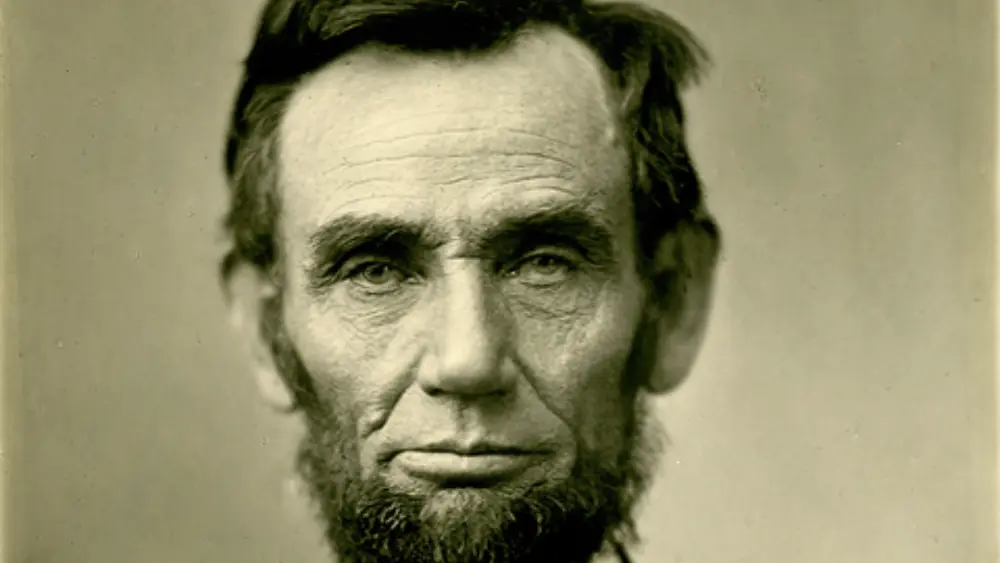Abraham Lincoln, born on February 12, 1809, in a log cabin in Hardin County, Kentucky (now LaRue County), rose from humble beginnings to become one of the most revered figures in American history. Serving as the 16th President of the United States, Lincoln’s leadership during the Civil War remains a defining chapter in the nation’s narrative.
Early Life and Political Ascent
Humble beginnings and a relentless pursuit of knowledge characterized Abraham Lincoln’s early life. Born in a log cabin on the Kentucky frontier, the challenges of pioneer life shaped Lincoln’s childhood. His family later moved to Indiana, where he continued to develop a strong work ethic and a thirst for education. Concurrently, he engaged in largely self-taught learning, delving into a variety of subjects through reading and studying borrowed books. This formative period not only shaped his intellectual pursuits but also instilled in him a sense of resourcefulness. Lincoln’s journey took a pivotal turn when his family settled in Illinois, and he began to immerse himself in the study of law.
Lincoln’s entrance into politics occurred during his service in the Illinois State Legislature, where he demonstrated his aptitude for public service and advocacy. His growing reputation as a thoughtful and eloquent speaker propelled him further into the political arena, leading to his election to the U.S. House of Representatives in 1846. Although his time in Congress was relatively short-lived, it marked the beginning of a political ascent that would eventually see him assume the highest office in the land. The challenges and experiences of his early political career laid the groundwork for Lincoln’s emergence as a national leader during one of the most unruly periods in American history.
Abraham Lincoln: Presidential Election of 1860 The Divided Nation
Abraham Lincoln’s election as the 16th President of the United States in 1860 marked a pivotal moment in American history. Running as the Republican candidate, Lincoln’s platform focused on preventing the expansion of slavery into new territories, a stance that resonated strongly with Northern voters. However, his victory triggered a severe backlash in the Southern states, where many saw it as a threat to their way of life based on the institution of slavery. The contentious election results highlighted the deep divisions within the nation over the issue of slavery, setting the stage for an uproar period ahead.
As Lincoln prepared to take office, the Southern states, one by one, began to secede from the Union. South Carolina led the way in December 1860, followed by Mississippi, Florida, Alabama, Georgia, Louisiana, and Texas. In February 1861, these seceded states convened in Montgomery, Alabama, to form the Confederate States of America. The election of Abraham Lincoln and the subsequent secession of Southern states plunged the United States into a full-fledged crisis, eventually leading to the outbreak of the Civil War in April 1861 as tensions reached a breaking point. Lincoln, facing the immense challenge of preserving the Union and navigating the complexities of the Civil War, would go on to become one of the nation’s most iconic leaders.
Secession and the Civil War
With the Confederate attack on Fort Sumter in April 1861, the nation was plunged into the Civil War, a conflict that would test Abraham Lincoln’s leadership and shape the course of American history. Lincoln, steadfast in his commitment to preserving the Union, declared the secession illegal and called for troops to suppress the rebellion. The onset of the Civil War marked the first time the United States faced a large-scale internal conflict, and Lincoln grappled with the immense challenges of leading a divided nation through this unprecedented crisis.
Throughout the Civil War, Lincoln faced the complexities of military strategy, political divisions, and the moral question of slavery. He navigated these challenges with a combination of strategic thinking, political acumen, and a moral vision that evolved over the course of the conflict. As the war progressed, Lincoln’s commitment to ending slavery solidified, leading to pivotal moments such as the issuance of the Emancipation Proclamation in 1863. Lincoln’s leadership during the Civil War remains a testament to his resilience, determination, and the profound impact of his decisions on the nation’s trajectory.
Abraham Lincoln: Emancipation Proclamation A Transformative Act
Abraham Lincoln’s Emancipation Proclamation, issued on January 1, 1863, during the Civil War, declared all enslaved people in rebel states “forever free.” It permitted Black soldiers in the Union and shifted the war’s focus from nation preservation to human freedom. Though not instant, its impact on the war and global liberation movements was profound.
By framing the conflict as a fight for freedom, the Emancipation Proclamation shifted the narrative of the Civil War, making it a moral struggle against the institution of slavery. This executive order also had significant diplomatic implications, as it not only garnered support for the Union cause from abolitionists both domestically and internationally but also bolstered the credibility of the Union on the global stage. Furthermore, by aligning the Union with the abolitionist movement, the executive order underscored a moral imperative that resonated beyond national borders. The Emancipation Proclamation laid the groundwork for the eventual abolition of slavery with the passage of the 13th Amendment in 1865 and stands as one of Lincoln’s most enduring and impactful contributions to American history.
Gettysburg Address: A Timeless Oration
Abraham Lincoln’s Gettysburg Address, delivered in November 1863 at the dedication of the Soldiers’ National Cemetery in Gettysburg, Pennsylvania, stands as one of the most iconic and timeless speeches in American history. In just a few concise and eloquent sentences, Lincoln conveyed profound messages about the principles of equality, democracy, and national unity.
Lincoln began the address by acknowledging the significance of the location, honoring the sacrifices of those who fought and died in the Battle of Gettysburg. Pivoting to the larger purpose of the war, he asserted that the nation was dedicated to the proposition that all men are created equal. The Gettysburg Address encapsulated Lincoln’s vision of a united and democratic America, emphasizing the idea that the nation should experience a “new birth of freedom.” Despite its brevity, the speech deeply resonated, encapsulating the essence of the Union cause and reaffirming the enduring principles upon which the United States was founded. Its concise yet powerful message left a lasting impression on the collective consciousness, serving as a poignant reminder of the nation’s ideals. The Gettysburg Address remains a poignant reminder of Lincoln’s ability to distill complex ideas into powerful and memorable words that transcend time.
Abraham Lincoln: Reconstruction and the End of the War
In the aftermath of the Civil War, Abraham Lincoln faced the formidable task of overseeing the reconstruction of a nation torn apart by conflict. Lincoln advocated for a moderate and lenient approach toward the defeated Southern states, seeking to bring them back into the Union swiftly and with as little animosity as possible. His vision for Reconstruction prioritized the restoration of the Union over punitive measures, aiming to reconcile the nation and heal the wounds of war.
Tragically, John Wilkes Booth assassinated Lincoln on April 14, 1865, just days after the surrender of General Robert E. Lee at Appomattox Court House, cutting short his presidency. Lincoln’s death marked a profound moment in American history, altering the course of Reconstruction and shaping the post-war era. His successor, Andrew Johnson, faced the immense challenge of implementing Lincoln’s vision for a reunified nation, a task that proved to be complex and contentious as the nation grappled with the aftermath of a devastating civil conflict.

Legacy and Impact
Abraham Lincoln’s legacy in American history stands as that of a transformative leader whose principles and vision profoundly shaped the nation. His commitment to preserving the Union and ending the scourge of slavery during a time of profound national crisis has not only solidified his status as one of America’s greatest presidents but also underscored his unwavering dedication to the principles of liberty and equality. Furthermore, his strategic vision and steadfast leadership played a pivotal role in navigating the nation through turbulent waters. Lincoln’s leadership qualities, characterized by moral clarity, resilience, and an unwavering dedication to justice, continue to inspire generations of leaders.
Beyond his immediate impact, Lincoln’s vision for a united and free nation has endured as a beacon of hope and aspiration. The American people enshrine his Emancipation Proclamation and the Gettysburg Address, among other seminal moments in his presidency, in their collective memory. Lincoln’s tragic assassination only served to enhance his legacy, turning him into a revered figure whose contributions to the nation’s history continue to be studied, celebrated, and remembered.











